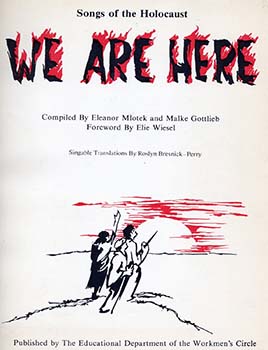A song of the Vilno ghetto by Shermke Kaczerginski (1908-1954) written after the death of his wife in April, 1943. It was first sung in the theatre revue Di Yugenish In Fas. Later it was sung in other ghettos and concentration camps. Kaczerginski joined the partisan forces following the liquidation of the ghetto in September, 1943. After the war he compiled a collection of several hundred ghetto songs. He survived the war to meet his death in a plane crash. Music is by Abraham Brudno who, following the liquidation of the ghetto, September 1943, was deported to a German concentration camp in Estonia where he died.

I roam through the ghetto
From alley to alley
Useless, no haven I find;
Gone my beloved.
Oh how can I bear it?
Won’t somebody say something kind!
My house is aglow now,
The sky so much bluer
What does that mean in my life?
I stand like a beggar,
I huddle at gateways
And beg for a handful of light.
Springtime, dispel my sorrow.
Bring my beloved,
My dear one to me.
Springtime, blue wings for me you’ll borrow,
Oh, take my poor heart,
And return my joy to me.
I go to my labor
I pass by our dwelling,
Bereaved now the gate is shut tight;
The day bathed in sunshine,
Sad flowers are fading.
They weep, for them too it is night.
At night when returning,
With deep sadness gnawing,
Right here, love, you waited for me.
Right here in the shadow
I still hear your step fall.
Your arms held me so tenderly.
Springtime, dispel my sorrow . . .
This year the springtime
Is with us so early,
My longing for you burst in bloom,
I see you as now, dear,
All covered with flowers,
With gladness you’ll come to me soon.
The sun has now showered
The garden with sunshine,
The earth is all covered in green.
My darling. my loved one,
Are you lost lor all time?
My mind cannot hear what that means.
Springtime, dispel my sorrow . . .
lkh blondzhe in geto
Fun gesl tsu gesl
Un ken nit gefinen keyn ort:
Nito iz mayn liber,
Vi trogt men ariber? —
Mentshn, o zogt khotsh a vort.
Es laykht af mayn heym itst
Der himl der bloyer —
Vos zhe hob ikh itst derfun?
lkh shtey vi a betler
Bay yetvedn toyer
Un betl — a bisele zun.
Friling, nem tsu mayn troyer.
Un breng mayn libstn,
Mayn trayen tsurik.
Friling, af dayne fligl bloye,
O, nem mayn harts mit
Un gib es op mayn glik.
lkh gey tsu der arbet
Farbay undzer shtibl,
In troyer — der toyer farmakht.
Der tog a tsehelter,
Di blumen farvelkte,
Zey vyanen — far zey iz oykh nakht.
Far nakht af tsurikvegs,
Es noyet der troyer.
Ot do hostu, libster, gevart.
Ot do inem shotn
Nokh kentik dayn trot iz,
Flegst kushn mikh liblekh un tsart.
Friling, nem tsu mayn troyer. . .
S’iz hayor der friling
Gor fri ongekumen,
Tseblit hot zikh benkshaft nokh dir.
lkh ze dikh vi itster
Balodn mit blumen,
A freyd iker geystu tsu mir.
Di zun hot fargosn
Dem gortn mit shtraln.
Tsheshprotst hot di erd zikh in grin.
Mayn trayer, mayn libster,
Vu bistu farfaln? —
Du geyst nit aroys fun mayn zin.
Friling, nem tsu mayn troyer. . .
איך בלאָנדזשע אין געטאָ
פֿון געסל צו געסל
און קען ניט געפֿינען קײן אָרט:
ניטאָ איז מײַן ליבער,
װי טראָגט מען אַריבער? —
מענטשן, אָ זאָגט כאָטש אַ װאָרט.
עס לײַכט אױף מײַן הײם איצט
דער הימל דער בלױער —
װאָס זשע האָב איך איצט דערפֿון?
איך שטײ װי אַ בעטלער
בײַ יעטװעדן טױער
און בעטל — אַ ביסעלע זון.
פֿרילינג, נעם צו מײַן טרױער,
און ברענג מײַן ליבסטן,
מײן טרײַען צוריק.
פֿרילינג, אױף דײַנע פֿליגל בלױע,
אָ נעם מײַן האַרץ מיט
און גיב עס אָפּ מײַן גליק.
איך גײ צו דער אַרבעט
פֿאַרבײַ אונדזער שטיבל,
אין טרױער — דער טױער פֿאַרמאַכט.
דער טאָג אַ צעהעלטער,
די בלומען פֿאַרװעלקטע,
זײ װיאַנען — פֿאַר זײ איז אױך נאַכט.
פֿאַר נאַכט אױף צוריקװעגס,
עס נאָיעט דער טרױער,
אָט דאָ האָסטו, ליבסטער, געװאַרט.
אָט דאָ אינעם שאָטן
נאָך קענטיק דײַן טראָט איז,
פֿלעגסט קושן מיך ליבלעך און צאַרט.
פֿרילינג, נעם צו מײַן טרױער. . .
ס׳איז הײַיאָר דער פֿרילינג
גאָר פֿרי אָנגעקומען,
צעבליט האָט זיך בענקשאַפֿט נאָך דיר,
איך זע דיך װי איצטער
באַלאָדן מיט בלומען,
אַ פֿרײדיקער גײסטו צו מיר.
די זון האָט פֿאַרגאָסן
דעם גאָרטן מיט שטראַלן,
צעשפּראָצט האָט די ערד זיך אין גרין.
מײַן טרײַער, מײַן ליבסטער,
װוּ ביסטו פֿאַרפֿאַלן? —
דו גײסט ניט אַרױס פֿון מײַן זין.
פֿרילינג, נעם צו מײַן טרױער. . .
Song Title: Friling

Compiled by sisters Malke Gottleib and Chana Mlotek, this collection of 40 songs, issued on the occasion of the 40th anniversary of the Warsaw Ghetto Uprising, reflects the suffering, despair, longing, as well as the strength, hope and courage that led the last remnant of enfeebled Jews to take up arms against the mammoth Nazi war-machine. Save for five songs, this compilation comprises songs that were actually written or sung in the ghettos and concentration camps. Four exceptions written after the war: “Babi Yar,” “Moyshelekh un Shloymelekh,” “Kadish,” and “Mayn mame hot gevolt zayn oyf mayn khasene” are often presented at commemorative gatherings and were therefore included. The fifth song “Am Yisroel Khay” was written in a D.P. camp and is an affirmation of the will of the survivors to build new lives for themselves, holding high their belief in the endurance of the Jewish people. To enable readers and singers not conversant with the Yiddish alphabet to utilize this collection, We Are Here! Songs of the Holocaust provides parallel transliterations and singable English translations by Roslyn Bresnick Perry.